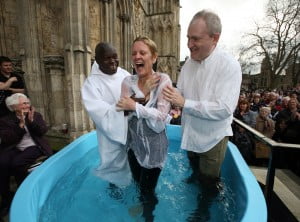Is baptism enough?
 Anglicans oftentimes get into difficulties with baptism. On the 1 hand, there continues to be a deviation of view between those who are happy with the Church's policy of baptising people of any historic period (i.e. including infants) and a minority who would have a more Anabaptist position and associate baptism with articulated profession of faith past the individual (i.e. past 'adults' simply). On the other, there is a problem with the relationship betwixt baptism and confirmation, generated from 2 directions.
Anglicans oftentimes get into difficulties with baptism. On the 1 hand, there continues to be a deviation of view between those who are happy with the Church's policy of baptising people of any historic period (i.e. including infants) and a minority who would have a more Anabaptist position and associate baptism with articulated profession of faith past the individual (i.e. past 'adults' simply). On the other, there is a problem with the relationship betwixt baptism and confirmation, generated from 2 directions.
Confirmation made some sense as a rite of passage to adult membership of the Church in a Christendom context. If the bulk of the population was baptised as infants, confirmation made sense as an opportunity for catechism (pedagogy) of candidates, and as a rite of full admission to Church membership, in detail, admission to Holy Communion.
Simply in recent years, the rationale for confirmation has been undermined in two directions. For one thing, since we are no longer in a Christendom mode of operating, and fewer people accept been baptised as infants, adults coming to religion are more often baptised at that point, rather than beingness confirmed as a sign of new organized religion delivery. It seems a real bamboozlement to then confirm immediately at the indicate of adult baptism.
For some other matter, theological thinking near baptism has argued that this 1 sacrament should be sufficient for the other—admission to Holy Communion. If Communion is the 'family' meal, and baptism is admission to the membership of the family, why should we require any more of the baptised before allowing them full participation? This has led to the recent 'admission of children to Communion prior to confirmation' which is the policy in most (if not all?) English dioceses at present. (Notation that Anglicans have never believed in 2 rites of babe baptism and adult baptism. There is one rite of baptism, which is administered sometimes to infants, sometimes to adults.)
These two factors have truly led to confirmation being a 'rite in search of a theology'. (Annotation that, for Anglicans, confirmation is a 'rite' and non a 'sacrament', since the Church of England but recognises baptism and Communion as dominical sacraments.)
 But a contempo publication under the aegis of the Church's Faith and Order Commission appears to exist proposing a theology for confirmation in which it 'borrows' some of the sacramental significance of baptism. The Journey of Christian Initiationadopts the thought of 'staged rites' (which underlies quite a number of the Mutual Worship services) to suggest that Christian initiation is only sacramentally complete once baptism has been followed by confirmation, the latter including episcopal laying on of hands and invocation of the Spirit. The next booklet in the Grove Worship serial is a broadside confronting this idea past the redoubtable Colin Buchanan, former bishop of Woolwich. Confronting the report, he offers a robust defence of the notion of BACSI—'baptism as consummate sacramental initiation'—based non only on NT texts, but also on cardinal celebrated Anglican documents.
But a contempo publication under the aegis of the Church's Faith and Order Commission appears to exist proposing a theology for confirmation in which it 'borrows' some of the sacramental significance of baptism. The Journey of Christian Initiationadopts the thought of 'staged rites' (which underlies quite a number of the Mutual Worship services) to suggest that Christian initiation is only sacramentally complete once baptism has been followed by confirmation, the latter including episcopal laying on of hands and invocation of the Spirit. The next booklet in the Grove Worship serial is a broadside confronting this idea past the redoubtable Colin Buchanan, former bishop of Woolwich. Confronting the report, he offers a robust defence of the notion of BACSI—'baptism as consummate sacramental initiation'—based non only on NT texts, but also on cardinal celebrated Anglican documents.
Colin starts by attacking the basis of the proposal inJourney:
So how can confirmation claim sacramental continuing to supplement water-baptism, or even (which The Journeying nearly says) to complete sacramental initiation? The Journey amazingly answers: '…it meets the first benchmark…of a sacrament in the Catechism: an outward and visible sign of an inward and spiritual grace (the 2nd benchmark being dominical institution) (p 14). There we take it—The Journey cites the canon definition, then calls confirmation a 'sacrament,' though it is neither so described nor even mentioned in the section on sacraments in that very catechism which is preparing candidates for confirmation… When ii criteria are vital, coming together only one is a useless commendation. (p four)
Colin and then goes on to scrutiniseJourneying's utilize of the NT passages, starting with the nine mentions of baptism in Acts. He is especially critical of deriving the exercise of (churchly) laying on of hands as a normative accessory to baptism:
The Journey assumes that 'being baptized' (annotation that, apart from 8.38, Acts always uses the passive) must have meant receiving not but water, just as well the laying on of churchly hands, conforming to the pattern. But will that supposition fit the occurrences? Well, [three of the instances] could fit the pattern, but [two others] would be very hard to brand fit it, and [a further two] would be frankly incommunicable. Furthermore, in Acts 8.4–17 and Acts 19.1–6, where a laying on of hands is mentioned, so … 'to baptize' could not include the laying on of easily and would have to mean solely the assistants of water. Withal everywhere else 'being baptized' has to exist read as concealing this laying on of easily within it. We run across an interpretative central which non only distorts the history being told, but more generally distorts the biblical authors' apply of linguistic communication.
He similarly considers in item the mentions of baptism in Paul and the other NT writers, and concludes thatJourney is seriously misreading the evidence:
And so what of this mail-baptismal apostolic laying on of hands? It occurs so rarely in the New Attestation that a jumbo onus of proof rests on those who advocate information technology as the normative design. Non simply do the gospels requite no hint, but they include Jesus teaching the apostles in John 14–16 about the souvenir of the Spirit, silent almost their destined role in ministering the Spirit. Not only does Acts have simply two instances of a post-baptismal laying on of churchly easily, only information technology has seven without such action, in some of which it was impossible. Not simply practice Paul's messages constantly cite baptism, but none attaches to it whatsoever apostolic function in laying on hands (an impossibility in ane Cor 1). No doctrinal element in becoming a disciple is somehow omitted from the baptismal account and needs subsequent provision by some other rite. Nevertheless The Journey, with a congenital-in desired consequence which the New Attestation virtually vetoes, scrabbles around the three exceptional texts to cobble together a example, and assert an apostolic blueprint.
Colin goes on to explore in detail the three passages in Acts in which laying on of easily accompanies baptism in some way, and in a fourth affiliate unpicks the idea of associating confirmation with the sacramental office of baptism in Christian initiation. He sets out whatJourneying calls 'certain truths about Christian Initiation' which 'seem articulate,' but is unconvinced:
Here are 'truths' alleged as 'clear.' Baptists would undoubtedly doubt it. And in the lite of Scripture, history and Anglican formularies, we as well have to say 'no.' The Journey is pushing out a gunkhole, one as watertight equally a sieve.
The 5th chapter of the booklet supports this, offering atour de force of engagement with the church fathers, the Anglican Reformers, and mod Anglican texts in a mode which I suspect just Colin could do. His determination is that confirmation is precisely that—confirmation of what happened in baptism, and not a separate 'sacramental' rite which adds something which was somehow missing in baptism. This leaves confirmation notwithstanding a 'rite in search of a theology', and in fact something quite unnecessary for adults being baptised.
Information technology has no visible meaning when administered to those baptized every bit adults (though something like may be used for other Christians becoming Anglicans), and the meaninglessness is hardly alleviated by its beingness coupled with baptism in a unmarried rite—baptism still lacks nothing in sacramental initiation which confirmation can supply. Anointing complicates that meaninglessness.
 This is a fascinating debate, and I think Colin offers a characteristically robust—and in this example, persuasive—statement. It has important implications for how we come across baptism, how we use baptismal liturgy, issues in mission, and the reception of non-Anglican Christians into the Church of England.
This is a fascinating debate, and I think Colin offers a characteristically robust—and in this example, persuasive—statement. It has important implications for how we come across baptism, how we use baptismal liturgy, issues in mission, and the reception of non-Anglican Christians into the Church of England.
But the debate too raises important problems about Anglican identity and doctrine. The idea that baptism isnot complete sacramental initiation appears to be presented at every bespeak past Journey asthe Anglican position—and the written report itself claims the say-so of FAOC, then is potentially speaking for the Business firm of Bishops. Only, as Colin argues, this is not and then, and the BACSI position has a much better historical and theological claim every bit the Anglican position. Something similar is happening hither as has happened with other aspects of Anglican worship. When I was training ordinands, they were universally surprised to larn that in Anglican liturgy the person leading Communion 'presides' whilst all the congregation 'celebrate', and he or she does that continuing by a 'table' and not an 'chantry.' Here is another arena where Anglican doctrine and Anglican do take drifted apart, and could do with coming together again.
The bookletBaptism as Complete Sacramental Initiation by Colin Buchanan is bachelor mail-free direct from Grove. Yous can sign upward to receive regular emails with news of new titles from Grove at www.grovebooks.co.uk
Much of my work is washed on a freelance basis. If you have valued this mail, would you considerdonating £1.20 a month to support the production of this blog?
If you enjoyed this, do share it on social media (Facebook or Twitter) using the buttons on the left. Follow me on Twitter @psephizo. Like my page on Facebook.
Much of my work is done on a freelance basis. If you have valued this post, y'all tin can brand a single or repeat donation through PayPal:
Comments policy: Good comments that engage with the content of the postal service, and share in respectful debate, can add together existent value. Seek first to empathise, and then to be understood. Make the most charitable construal of the views of others and seek to acquire from their perspectives. Don't view debate as a disharmonize to win; address the argument rather than tackling the person.
edwardsworgalenly.blogspot.com
Source: https://www.psephizo.com/life-ministry/is-baptism-enough/
0 Response to "Is baptism enough?"
Postar um comentário